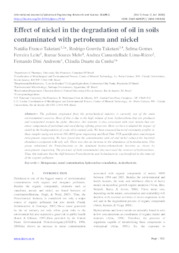Effect of nickel in the degradation of oil in soils contaminated with petroleum and nickel.
Effect of nickel in the degradation of oil in soils contaminated with petroleum and nickel.
Author(s): TAKETANI, N. F.; TAKETANI, R. G.; LEITE, S. G. F.; MELO, I. S. de; LIMA-RIZZO, A. C.; ANDREOTE, F. D.; CUNHA, C. D. da
Summary: Abstract: The pollution originated from the petrochemical industry is currently one of the main environmental concerns. Most of this is due to the high volume of toxic hydrocarbons that are produced and transported around the globe. However, this industry is also associated with toxic metals that are minor components of petroleum and used during refining processes. Here we have evaluated the impact of nickel in the biodegradation of crude oil in natural soils. We have assessed bacterial community profiles in these samples using ion torrent 16S rRNA gene sequencing and Real-Time PCR quantification and shotgun metagenome sequencing. We have found that the contamination with oil and nickel reduced the bacterial abundance compared with only soil. There was also an increase in the abundance of Actinobacteria. This group substituted the Proteobacteria as the dominant hydrocarbonoclastic bacteria as shown by metagenome sequencing. The presence of both contaminants also increased the removal of hydrocarbons. Thus, this indicates that the shift between Proteobacteria and Actinobacteria was beneficial to the removal of the organic pollutant.
Publication year: 2020
Types of publication: Journal article
Unit: Embrapa Environment
Observation
Some of Embrapa's publications are published as ePub files. To read them, use or download one of the following free software options to your computer or mobile device. Android: Google Play Books; IOS: iBooks; Windows and Linux: Calibre.
Access other publications
Access the Agricultural Research Database (BDPA) to consult Embrapa's full library collection and records.
Visit Embrapa Bookstore to purchase books and other publications sold by Embrapa.

